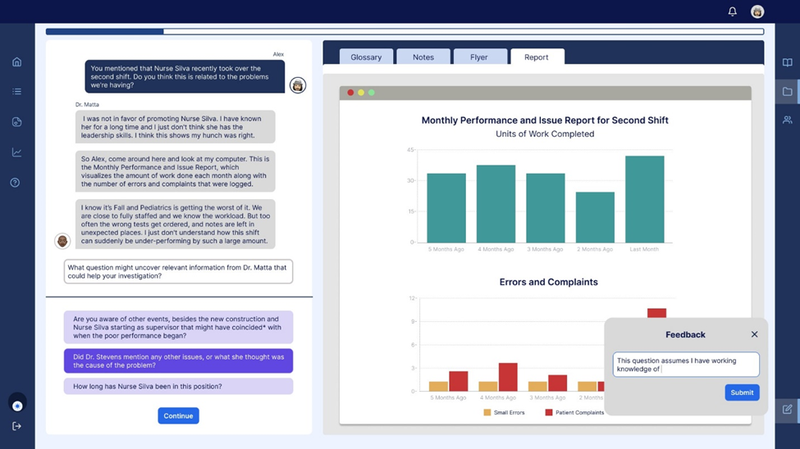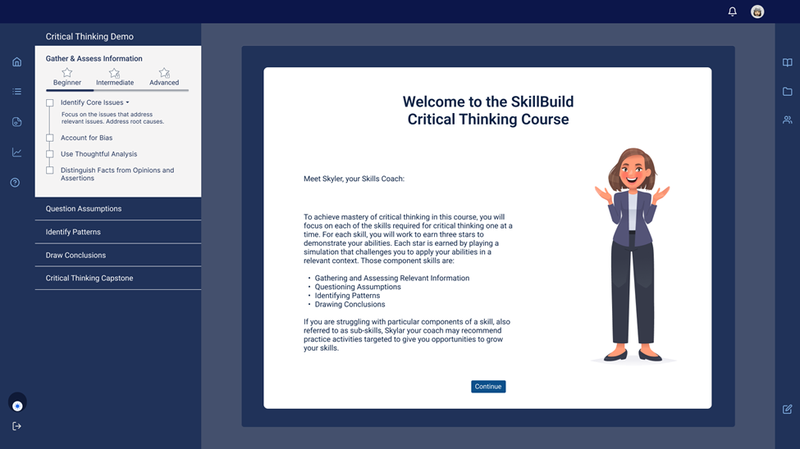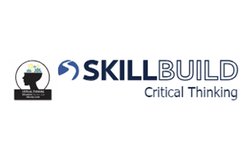SkillBuild by Muzzy Lane is a series of online short courses to help higher education institutions, employers, and learners to develop, assess, and verify soft skills that are in high demand among employers.
SkillBuild courses empower learners to gain and demonstrate soft skills such as critical thinking, collaboration, oral communication, and resilience. SkillBuild uses role-playing simulations, where Muzzy Lane has long been one of the industry leaders, to provide learners with authentic, experiential learning activities. Along the way, learners are presented with real-world scenarios and asked to make choices that build on each other. As they encounter new information and see the effects of their decisions, they learn to course-correct. Simultaneously, the simulations auto-assess the learner’s mastery of each skill, so employers and educators can trust the accompanying microcredential.
Higher education institutions can incorporate these courses as they transition to more skills-based programming, while employers can integrate SkillBuild into their learning and development programs to support employees in upskilling or reskilling.
Anyone can access SkillBuild from the Muzzy Lane website, and the courses run on any browser or operating system. Muzzy Lane’s Learning Tools Interoperability integration allows schools and employers to embed SkillBuild courses in their LMS platforms.
Formats:
SkillBuild uses a web-based interface.
Website:
https://muzzylane.com/skillbuild
What does it help with?
According to research from America Succeeds, job postings request soft skills four times more often than hard skills. SkillBuild helps higher education institutions, employers, and learners develop, assess, and verify skills including critical thinking, oral communication, resilience, intercultural fluency, collaboration, creative problem-solving, initiative, and empathy.

Grade and age range:
SkillBuild is designed for use by students in higher education, as well as professionals who are interested in upskilling.
Core/supplemental/special needs/extracurricular/professional development:
SkillBuild can be used in supplemental, extracurricular, or PD contexts.
Standards:
Developed in partnership with Education Design Lab, the courses are built on the Lab’s foundational 21st Century Skills framework and based on Muzzy Lane’s extensive experience working with universities and other educational organizations, including Western Governors University, Excelsior University, Herzing University, Arizona State University, and McGraw-Hill.
Lesson time needed:
SkillBuild’s sub-competency level courses take approximately one to three hours, and full competency-level courses vary from five to 15 hours.
Pricing model:
Pricing for an individual learner starts as low as $19.99. Customizable and discounted pricing can be provided accorded to the needs and size of institutional/group learning.

Extra services:
No extra services are required.
What makes SkillBuild unique?
SkillBuild makes it easy to develop and assess difficult-to-measure soft skills such as critical thinking, collaboration, oral communication, and resilience.
Characteristics:
SkillBuild uses an engaging chat-style and decision-tree approach and brings scenarios to life with engaging multimedia assets.
Developed in partnership with Education Design Lab (the Lab), the courses are built on the Lab’s foundational 21st Century Skills framework. We use backward design, so each course starts with a skill map that learners are attempting to master, then assessments are built at three levels to measure mastery of those skills. Learners who don't demonstrate mastery of all the skills receive remediation at two levels (practice and tutoring) targeting the skills they need to learn. We also use Learning Engineering, gathering data and feedback from learners to iterate and improve the courses.
SkillBuild is available via any internet connected device.
Here’s what users are saying:
“The Muzzy Lane auto-assessment "Save the Museum" allows the students to apply each module from the course. With the Critical Thinking course being scaffolded in a way that allows the students to see each piece separately and how it works, the auto-assessment allows the student to apply those pieces altogether in a real-world scenario. The assessment moves at the student's pace, while ensuring they are utilizing and applying the tools they've learned throughout the course. It helps the students see the big picture of Critical Thinking and how the pieces work together for the final conclusion/recommendation. “
—Elizabeth Potter, business instructor at Federal Prison Programs, Pima Community College
“Even though it was challenging, I feel that this challenge forced me to understand more of what I was SUPPOSED to gather from it. Overall, it was an awesome experience!”
—Cam Callahan, student











